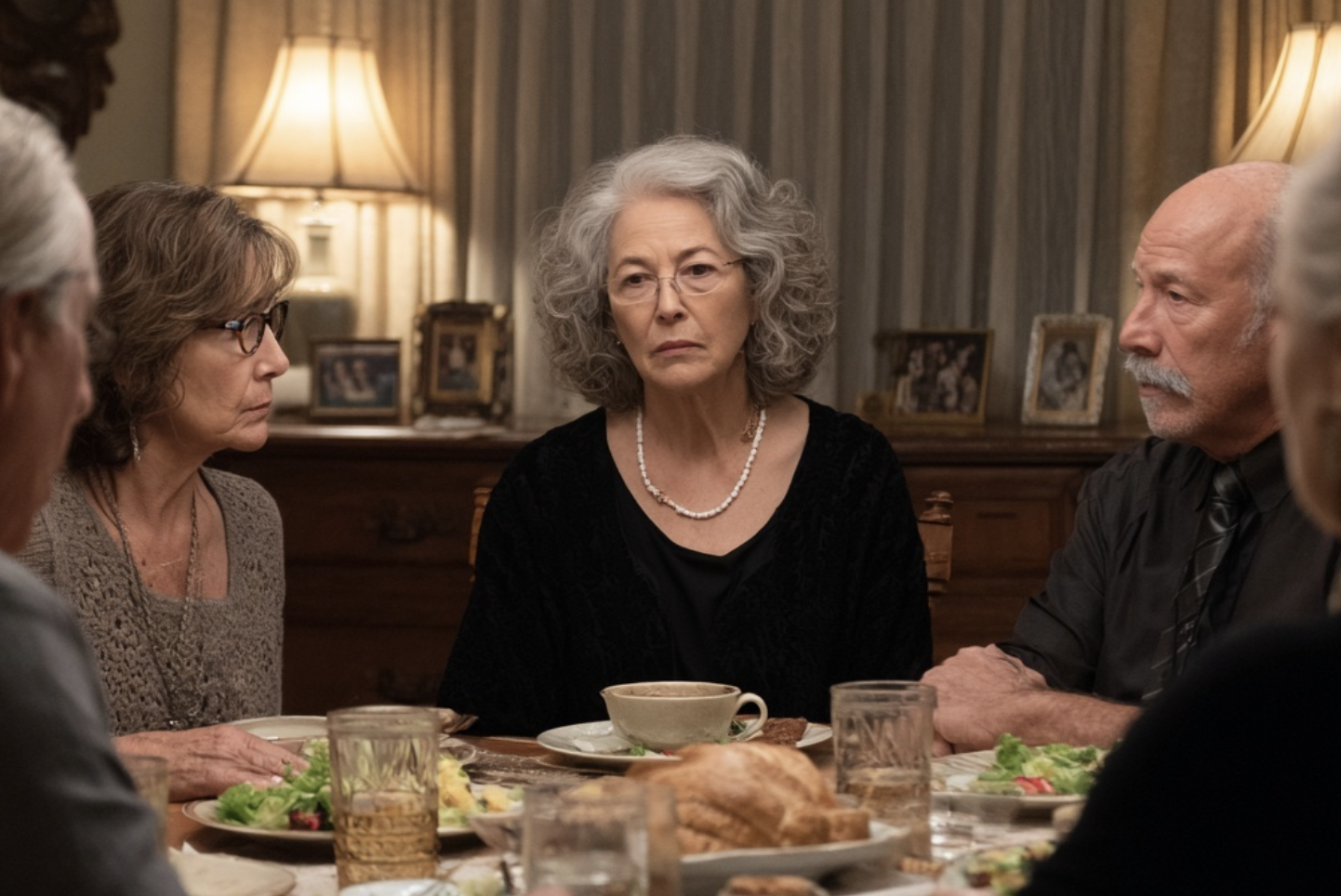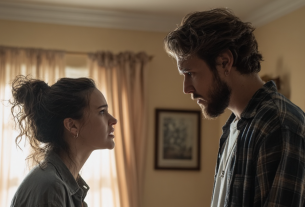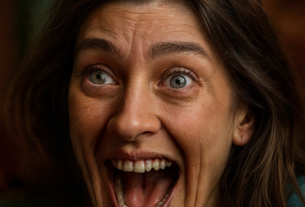Emma Nikolaevna had been bustling in the kitchen since early morning. Cutlets were sizzling in the pan, and the oven smelled of apple pie. Olga followed her husband into the apartment, caught the familiar aromas, and sighed.
“Vitya, something definitely happened. Emma only bakes pie for special occasions.”
“Oh, come on, Mom,” Viktor shrugged off his jacket and pecked his mother on the cheek. “How are you? Is your blood pressure behaving?”
“It’s fine,” Emma Nikolaevna waved it off. “Isn’t Nastya with you?”
“She got held up at work,” Olga pulled a box of chocolates from the bag. “She said she’ll be here in about twenty minutes.”
“All right. Then we’ll wait for everyone.”
“What do you mean, everyone?” Viktor froze with a slipper in his hand. “Who else is coming?”
“Pasha and Lena with the kids. I invited them.”
Olga raised her eyebrows. Her husband’s younger brother and his family didn’t come by their mother’s often—the last time they’d seen each other was New Year’s, and even then only briefly.
“Mom, did something happen?” Viktor frowned.
“We need to talk. All together,” Emma Nikolaevna turned back to the stove. “The cutlets will get cold, then I’ll have to reheat them.”
“I’ll set the table in the meantime,” Olga volunteered, taking the festive tablecloth from the cupboard.
“God, don’t tell me she’s sick?” a pang shot through her chest. Her mother-in-law was already seventy-nine, a serious age. Maybe she’d been given some diagnosis? The thought made her mouth go dry.
The doorbell rang—Nastya arrived, their daughter-in-law, the wife of their son who was away on a business trip. Almost immediately afterward, Pavel came with his wife and their two teenage kids.
“Oh, the whole gang’s here!” Pasha exclaimed in surprise, hugging his mother. “What’s the occasion?”
“Let’s sit down, and I’ll tell you everything.”
Viktor exchanged a glance with Olga. In thirty years of marriage they had learned to understand each other without words. “Something serious,” his look said.
They squeezed in shoulder to shoulder. At the head of the table, Emma Nikolaevna looked unusually solemn.
“Well, Mom, spill it already,” Viktor couldn’t hold back. “What happened?”
“I’ve made a decision,” Emma Nikolaevna squared her shoulders. “I’m transferring our house and the dacha to Pasha.”
Silence fell over the table. Olga felt her fingers go numb.
“In what sense?” Viktor set down his fork.
“In the literal sense. Pasha helps more; he comes with the grandkids. And you, Vitya, live your own life.”
“Mom, we—”
“I’ve decided,” Emma Nikolaevna cut him off. “I’ve already called the notary; we’ll take care of it next week.”
Olga sat without moving. A ridiculous thought spun in her head: “What about the renovation at the dacha? We re-roofed it two years ago…”
“You agree, don’t you?” Emma Nikolaevna looked around at everyone, though her gaze rested mostly on Viktor.
“Well, if that’s what you’ve decided…” he mumbled.
Pavel cleared his throat.
“Mom, maybe there’s no need to rush?”
“What’s there to drag out? I’m pushing eighty,” she waved a hand. “That’s it, decided.”
Nastya shifted awkwardly in her chair.
“Emma Nikolaevna, maybe…”
“Enough,” the mother-in-law slapped her palm on the table. “I’ve said it. Now eat the cutlets before they get cold.”
Three minutes. Just three minutes was all it took to wipe out thirty years. Olga chewed mechanically at a cutlet that tasted like nothing. Beside her, Viktor chatted with his brother about a soccer match as if nothing had happened. How could he? Did he really not care?
“Olga, why aren’t you eating?” her mother-in-law slid a salad bowl toward her. “I pickled the cucumbers myself, just how you like them.”
“Thank you, Emma Nikolaevna,” Olga forced a smile. “I just don’t have an appetite.”
“As if nothing happened,” her temples throbbed. “Thirty years in the family, and I turned out to be a stranger.”
“Olga, you okay?” Viktor touched her elbow as they were heading home.
“Perfectly,” she pulled her arm away. “How about you—feeling fine?”
“What’s the big deal?” he shrugged. “It’s Mom’s property—her right.”
“Seriously?” Olga stopped in the middle of the sidewalk. “We’ve been together thirty years and you—”
“And what? Was I supposed to make a scene?”
“You could have said something!” She clenched her fists. “Anything!”
“Olga, why are you getting worked up? It’s just a house. We don’t live there.”
“It’s not about the house!” Her voice betrayed her and wavered. “It’s about how it was done. They decided among themselves, and we were just… furniture at the table.”
Viktor rolled his eyes.
“Good grief, what a drama. Let’s go home, it’s getting cold.”
At home, Olga changed in silence and went to the kitchen. Her hands trembled as she brewed tea.
“Thirty years wiped clean. And to everyone, what am I? An attachment to Viktor?”
Her phone pinged—a message from Nastya: “How are you? I’m in shock from today.”
“Fine,” Olga replied shortly.
“Mom, why the long face?” their daughter peeked into the kitchen, home from the dorm for the weekend.
“Oh, nothing,” Olga waved a hand. “Grandma decided to sign the house and dacha over to Uncle Pasha.”
“So what?” the daughter shrugged—just like her father.
“Nothing,” Olga pressed her lips together. “It’s just unpleasant when you don’t count for anything.”
“Oh, come on,” the daughter opened the fridge. “It’s Grandma’s house. Why stress?”
“And she too,” Olga took a sip of tea.
A week later, Emma Nikolaevna called with “good” news—the documents were signed. Viktor only nodded and said, “Okay, Mom.” Olga quietly left the room.
A month passed. Olga hardly spoke to her mother-in-law and answered in monosyllables. Things were tense with Viktor too—he didn’t understand why she was hurt.
“Are you sick?” he asked one morning when, for the third time that week, she refused to go to a family dinner.
“No.”
“Then what’s the matter?”
“Do you really not get it?” Olga looked at him wearily. “I was tossed out of the family with a single decision, and you didn’t even notice.”
“What nonsense!” he threw up his hands. “What’s that got to do with you?”
“Everything!” she raised her voice. “For thirty years I cooked borscht for your mother, helped in the garden, hauled jars of preserves for winter. And in the end, what am I? Nobody!”
“You’re dramatizing.”
Viktor’s phone rang. It was Pavel.
“Yeah, Pasha. What?” His face changed. “Sell it? But that’s… Yeah, got it.”
He slowly lowered the phone.
“What is it?” Olga asked.
“Pavel’s decided to sell the house. Says it’s inconvenient for them to go there.”
“And?”
“What do you mean ‘and’?” Viktor looked at her in bewilderment. “That’s our house! I mean… it was.”
“Oh, so now you understand,” Olga smiled bitterly. “Only now it’s sunk in.”
“But I thought…”
“Exactly,” she sighed. “You thought it would all somehow work itself out. That it was just a formality.”
Viktor sank onto a chair. For the first time in a long while, Olga saw confusion in his eyes.
“So what now?” he rubbed his temples.
“Now?” she shrugged. “Now we’ve learned what we are to your family. Outsiders.”
Two more months passed. Olga stood at the window watching the rain drum against the glass. Her phone vibrated in her pocket—Nastya was calling.
“Hi. How are you?”
“Fine,” Olga absentmindedly wiped the fogged-up pane. “Why?”
“Oh, just… I heard Pavel’s already found a buyer for the house.”
Olga pressed her lips together.
“And? That’s not our business anymore.”
“I don’t think Emma Nikolaevna knows. Yesterday she was talking about planting cucumbers at the dacha in summer.”
“Nastya, I don’t want to get involved,” Olga rubbed her temple. “I’ve had a constant headache as it is.”
“Blood pressure?” worry sounded in the daughter-in-law’s voice.
“Yeah, it’s been spiking lately. The doctor says it’s nerves.”
After the call, Olga lay down. Sleep wouldn’t come. Fragments of thoughts spun in her head. “Thirty years down the drain… Retirement around the corner, and housing… Emma didn’t even apologize…”
The front door banged—Viktor was back. Lately he’d grown quiet and stayed late at work.
“Hey,” he looked into the bedroom. “Lying down again?”
“Headache.”
“Maybe we should see a doctor?”
“I already did,” she turned to the wall.
Viktor stood in the doorway, then softly closed the door. A minute later, dishes clattered in the kitchen.
Olga closed her eyes. When did everything go crooked? They used to discuss everything, decide together. Now he was there, she was here. Like roommates.
The door creaked again.
“Olga, we need to talk,” Viktor sat on the edge of the bed.
“About what?” she didn’t even turn.
“I’ve been thinking about… this whole situation. We’ve been together thirty years.”
“And?”
“Pasha is selling the house. He’s going to split the money.”
She sat up sharply.
“What?”
“He called—said he’d give us a share.”
“A handout, then,” Olga gave a bitter smile. “No, thank you.”
“Olga, don’t be foolish. We need to set something aside for old age.”
“And where were you when the decision was being made?” she gripped the blanket. “Why were you silent then?”
“I didn’t think it would turn out like this,” he lowered his head. “Mom always said the house was for all the kids.”
“And how did it turn out? We were just crossed out!”
“Olga…”
“No, Vitya. This isn’t about money. It’s about respect. About the fact that we don’t count as people. Especially me.”
“What do you have to do with it?”
“Everything!” she raised her voice. “I’ve been in your family for thirty years, and nobody cares what I think!”
Viktor was silent, staring at the floor.
“Do you know my blood pressure goes up to 160?” Olga asked quietly. “That I’m swallowing pills by the handful?”
“I didn’t know,” he looked up at her. “You didn’t say.”
“And you didn’t ask.”
The kettle began to whistle in the kitchen. Viktor stood.
“Want some tea?”
“I do,” Olga answered, surprising herself.
They sat over tea in silence. Then Viktor said:
“I don’t know what comes next.”
“Me neither,” she wrapped her hands around the cup. “But it can’t go on like this.”
“Maybe we should see a therapist?”
“You think it’ll help?”
“I don’t know,” he shrugged. “But it certainly won’t hurt.”
Suddenly Olga felt her eyes sting.
“Vitya, I just want to be heard. Do you understand?”
“I do,” he carefully covered her hand with his. “It’s just… I’m so used to you always being there. I thought it would always be like that.”
“I thought so too,” she smiled sadly. “And then I realized no one guarantees anything.”
“So what do we do?”
“I don’t know. But let’s at least talk to each other. For real.”
They talked late into the night. For the first time in many months.
The next morning, Viktor woke earlier than usual.
“Where are you going?” Olga asked sleepily.
“To Mom’s,” he buttoned his shirt. “I need to talk to her.”
“Good luck,” she turned onto her other side.
He came back that evening, scowling.
“Well?” Olga asked.
“Nothing,” he sank wearily into an armchair. “She thinks she did everything right.”
“And now what?” Olga set a plate of dinner in front of him.
“Pasha sold the house,” Viktor rubbed the bridge of his nose. “They finalized the deal yesterday.”
“And Emma Nikolaevna?”
“They told her they’re doing renovations. She’s staying with them for now.”
Olga shook her head.
“And how long will that last?”
“I don’t know,” he sighed. “Pasha says he’ll buy her an apartment later, closer to them.”
“Hard to believe.”
“Me too,” Viktor pushed the plate away. “Olga, I was thinking… maybe we need to change something too?”
“What do you mean?”
“Well, I talked to the guys at work. Igor—remember him? He bought a house in the suburbs. Small, but his own. Says the mortgage rates are decent.”
“Vitya, we’re almost sixty—what mortgage?”
“That’s just it!” he brightened. “Retirement is soon, and we don’t have a place of our own. The apartment is rented, the dacha was… shared. And now there’s nothing at all.”
Olga stirred her tea, thinking.
“So what are you proposing?”
“Let’s go take a look. It’s not far—half an hour by commuter train.”
A week later they were standing in front of a small wooden house. A tiny plot, apple trees, a porch with peeling paint.
“Well?” Viktor looked at her hopefully.
“It’s old,” Olga walked across the creaky floorboards. “It needs work.”
“But it’ll be ours. Completely. No one will take it away.”
That argument gave her pause.
“You know,” she said, stepping out onto the porch, “I’ve spent my whole life afraid of offending someone. Your mother, you, the kids. Always thinking about others.”
“And what’s so bad about that?”
“That I forgot about myself,” she smiled for the first time in a long while. “Let’s buy it. Let’s make it ours.”
A month later they signed the papers. The house needed repairs, money was tight, but Olga felt a strange relief.
“Now it’s only ours,” Viktor said as they moved the first boxes.
That evening Nastya called:
“How are you two? Settling in?”
“Little by little,” Olga sat on the porch with a mug of tea. “We’re going to redo the roof.”
“Grandma asked about you.”
“And what did you tell her?”
“That you bought a house. She was surprised.”
Olga smirked.
“I can imagine.”
“Olga,” Nastya’s voice turned serious, “she’s getting old. She gets mixed up sometimes. Maybe you could make peace?”
“It’s not about a quarrel, Nastya. It’s just… time has put everything in its place.”
A week later there was another call—this time from Pavel.
“Hi, how are you?” his voice sounded strained.
“Fine,” Olga answered curtly.
“Listen, Mom wants to see you. Can I bring her over?”
Olga was silent for a moment, then sighed.
“Bring her.”
Emma Nikolaevna looked gaunt. She walked into the house without a word and glanced around.
“It’s nice here,” she finally said. “Cozy.”
“Thank you,” Olga put the kettle on.
“I wanted to say…” Emma Nikolaevna hesitated. “Pasha sold the house.”
“We know.”
“And he didn’t even ask me,” the old woman’s voice trembled with tears. “Now I’m in a studio in the city. And I’ve had a garden my whole life…”
Olga poured the tea in silence.
“Forgive me, Olga,” the mother-in-law suddenly said. “I’m old and foolish. I thought I was doing what’s best.”
“Emma Nikolaevna,” Olga looked her in the eye, “I don’t hold a grudge. Life just goes on.”
When her mother-in-law left, Viktor hugged his wife.
“You’re amazing.”
“You know,” she leaned against his shoulder, “I realized one thing. You have to say what you feel. Right away. Not bottle it up for years.”
“Exactly,” he kissed the crown of her head. “And rely on yourself.”
“And on those who are truly by your side,” she added.
That evening they sat on the porch of their house. Small, in need of repairs—but theirs. Ahead was a new chapter of their life. Without resentments and unspoken words. Without fear of saying what you think.
“You know, Vitya,” Olga watched the sunset, “I don’t think I’ve measured my blood pressure in a week.”
“That’s a good sign,” he smiled, squeezing her hand. “A very good sign.”


